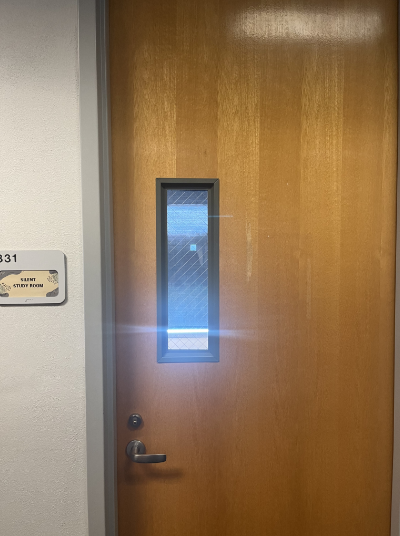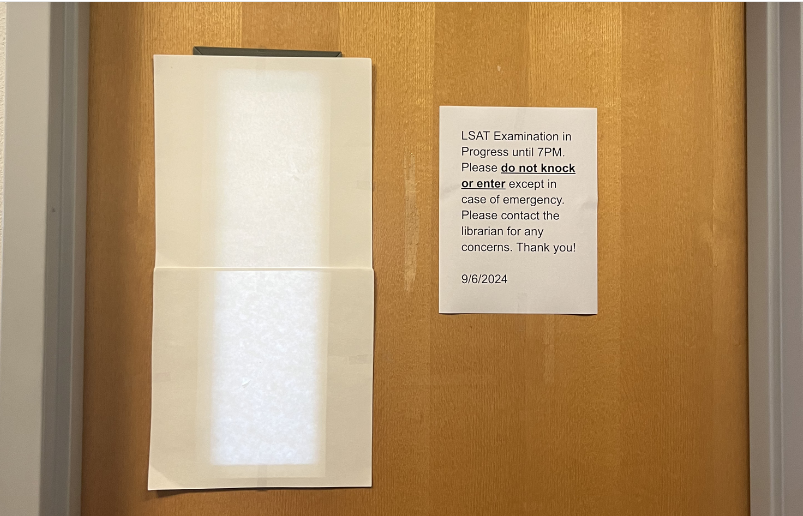Photo courtesy of Jalise Martinez Lopez
By Riley Benson
For many college students, their senior year is busy applying to graduation, getting their senior picture taken and job searching. But for future law students, the fall and summer semesters consist of cramming for the Law School Admissions Test (LSAT) and applying to law school.
Pre-law students at the USF St. Petersburg campus are now preparing for the next step of their education.
Jalise Martinez Lopez, a senior studying political science, is in the midst of taking her LSAT for the second time this fall and will be applying for law school soon. As a resident at the St. Petersburg campus for the past three years, she’s surprised at the issues she’s run into when attempting to take the remotely proctored LSAT on campus.
To take the remote LSAT, students must be in a well-lit private room, where there will be no noise interrupting the test, with no windows, and if any, they must be covered.
In theory, rooms located on the third, silent study, floor at the Nelson Poynter Memorial Library (NPML), should be perfect, except for the fact that the doors have windows.
When Martinez first encountered this issue, she was initially told by library staff that covering the door’s windows violated a policy and that they would be unable to accommodate the issue.

Later on, Martinez later spoke to the professional staff at her on-campus job in the University Student Center (USC) about the issue, and in the meantime they were able to reserve a room upstairs at the USC and reach out to the library to see if there would be a way to make the study room work.
While a study room in the USC may work, as any windows can be covered, it’s a risk considering that events are often hosted in nearby ballrooms, downstairs in the Reef or outback in the volleyball or basketball courts.
“As a first-generation college student, and the only person in my family to pursue a law degree, the whole application process has been tough enough as is,” said Martinez. “I was [shocked] when I was told by multiple offices on campus, including the library, that basic accommodations, which would have made the locations suitable for testing, could not be made.”
In the last decade, the number of recent graduates pursuing a masters, or a comparable degree, has increased by almost 20%, according to The National Center for Education Statistics.
Martinez found it interesting that at USF St. Petersburg, where students are often taking the LSAT or other remote standardized tests, like the Graduate Management Admission Test (GMAT) and Graduate Record Examinations (GRE), the school did not have rooms in place for others in her situation.
Nearby, at St. Petersburg College (SPC), they have rooms specifically for students that are needing to take remotely proctored tests. All SPC students need to do is make an appointment ahead of time.
Meanwhile, at the USF Tampa campus, they offer a multitude of standardized tests in person, including the LSAT, on set test days for students to utilize.
When The Crow’s Nest contacted the USF St. Petersburg Testing Services to ask if there were any other locations on campus that satisfied the requirements needed for taking standardized tests, Cynthia “CeCe” Edwards, director of the Debbie Nye Sembler Student Success Center, stated that she was “unaware of any USF St. Petersburg location that meets the testing specifications for some of the national standardized tests.”
For Martinez’s LSAT in September, the library was able to make accommodations for her after professional staff reached out, but now, as she prepares the take the test again this November she is facing the same issues.
“As an educational institution, I would expect that the educational and professional success of their students is a priority. Having no resources available nor allowing exceptions for students that require remote conditions for standardized testing puts students, like myself, in stressful positions; especially for those who are low-income and can’t afford to book a hotel,” Martinez said.
When she contacted the library again about being able to make accommodations, they told her that the previous measurements they made were a one-time deal. Now she begins to look for places on campus, once again, to be able to take the LSAT again.
“I hope to spread to awareness with USF St. Petersburg administration about the lack of accommodations for tests and at a minimum implement some sort of policy where an exceptions to policies, like at the library, can be made for students taking remote standardized tests,” she said.



